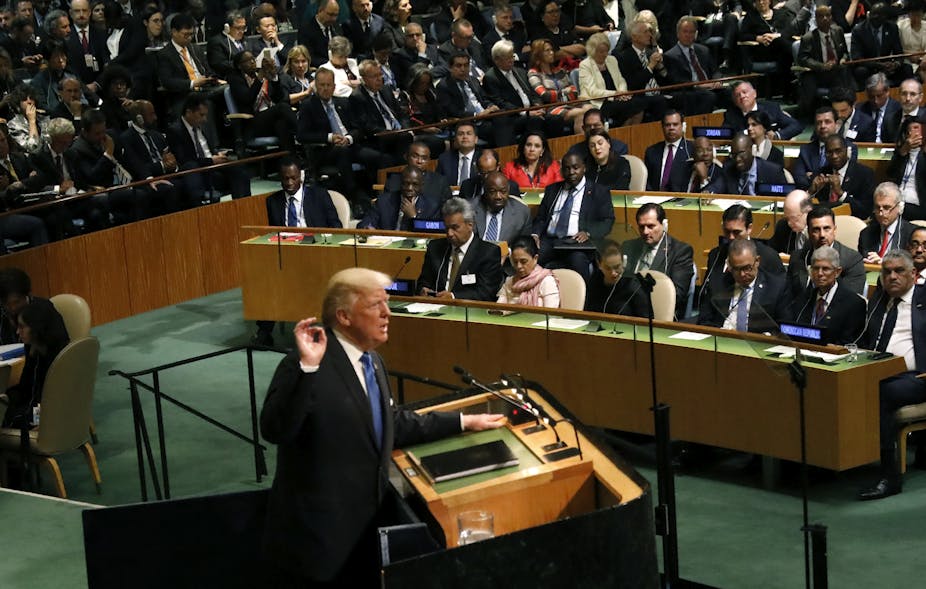Africa’s leaders, along with everyone else interested in US-Africa relations, have waited eight months for US President Donald Trump’s administration to explain its Africa policy. We aren’t there yet.
But in recent weeks Trump has indicated the level and extent of his interest. And, senior African affairs officials at the State and Defence Departments are at last attempting publicly to outline US goals and objectives toward Africa. This, apparently without much guidance from their president.
Trump’s inaugural address to the UN General Assembly said little about Africa – barely one paragraph towards the end. One sentence praised African Union and UN-led peacekeeping missions for “invaluable contributions in stabilising conflicts in Africa.” A second praised America, which
continues to lead the world in humanitarian assistance, including famine prevention and relief in South Sudan, Somalia and northern Nigeria and Yemen.
The next day Trump hosted a luncheon for leaders of nine African countries –Cote d’Ivoire, Ethiopia, Ghana, Guinea, Namibia, Nigeria, Senegal, Uganda, and South Africa. Only his welcoming remarks have been published but they are nearly devoid of policy content or guidance. His opening gambit reminded me of a 19th century colonialist hoping to become rich, as he proclaimed:
Africa has tremendous business potential, I have so many friends going to your countries trying to get rich. I congratulate you, they’re spending a lot of money….It’s really become a place they have to go, that they want to go.
Trump called on African companies to invest in the US. Then, shifting to security cooperation, he urged Africans to help defeat Islamist extremists and the threat from North Korea.
The American president proposed no new presidential initiatives for Africa. But, at least, he did not say those launched by predecessors were a waste of money and would be ended. Nor did he mention opposition to foreign assistance generally. He also did not mention his renunciation of the Paris Climate Accord and refusal to fund Green Climate Fund. Both are crucial for Africa’s adaptation to global warming.
Hints of a policy taking shape
A “US-Africa Partnerships” conference at the US Institute for Peace in Washington in mid-September provided additional clues to how this administration will conduct Africa policy.
Under Secretary of State for Political Affairs, Tom Shannon, offered the first high level official statement on Africa. Shannon, a highly accomplished Foreign Service officer, emphasised policy continuity. But, he implicitly affirmed Trump’s apparent desire for minimal engagement in Africa.
Shannon and Acting Assistant Secretary Donald Yamamoto at a later session, stressed the four main pillars that have framed Africa policy for many years, would remain. These are:
peace and security;
counterterrorism;
economic trade, investment and development; and,
democracy and good governance.
They endorsed previous presidential initiatives, including specific references to former US President Barack Obama’s Feed the Future, Power Africa and the Young African Leaders Initiative. Their continuation, and at what levels, will depend on budget decisions. Trump’s initial recommendations, endorsed by Secretary of State Rex Tillerson, call for crippling cuts.
So far, the only new social development programme that Trump has endorsed is the World Bank’s global Women Entrepreneurs Finance Initiative, championed by his daughter Ivanka. The US has donated USD$50 million toward its global start-up budget of USD$315 million. As Yamamoto noted at the September meeting, Africa could benefit from this initiative.
Surprise praise for China
Trump will be less likely to challenge US military’s commitments in Africa. With this in mind I paid close attention to the address by General Thomas Waldhauser, Commander of the US Africa Command (Africom) at the September 13 meeting. He set out Africom’s current engagements in Libya and Somalia, where he said the mission was to support locally engineered political solutions.
Critics of America’s many previous failed interventions in these two countries and elsewhere, will rightly remain sceptical.
The second part of his address dealt more broadly with Africom’s capacity building assistance, nationally and regionally. He said Africom only operates where
US and partner nation strategic objectives are compatible and aligned and, second, the operations are conducted primarily by partner nation forces with the US in a supporting role.
Africom, he said, conducts “some 3,500 exercises, programs and engagements” annually, with “5-to-6,000 US service members working on the continent every day.”
Waldenhauser ended his address with a surprisingly specific and positive view on China’s role in Africa. He praised China’s assistance to building much needed infrastructure throughout Africa and for the rapid growth in China-Africa trade which exceeded USD$300 billion in 2016.
On security issues, he commended Chinese President Xi Jinping’s pledge of USD$100 million to the AU and for supporting UN peacekeeping missions with 8,000 police officers. He then referred to the construction of China’s first overseas military base, which is near the US base in Djibouti, as creating “opportunities found nowhere else in the world,” relating that:
China assigned the first soldiers to this base and expressed interest in conducting amphibious training between Chinese and US Marines. Across the continent, we have shared interests in African stability. We see many areas where we can cooperate with the Chinese military. For example, we both support UN peacekeeping missions and training with African defence forces. The fact that we have mutual interests in Africa means that we can and should cooperate.
To emphasise the importance of this comment he quoted Secretary of Defence James Mattis when he pointed out earlier this year:
Our two countries can and do cooperate for mutual benefit. And we will pledge to work closely with China where we share common cause.
Charting the future
But China-US security cooperation in Africa can’t succeed without the inclusion of African governments as equal partners in this “common cause”.
Such “win-win-win” experiments in mutual confidence building would not only benefit Africans, but could also serve as positive examples for other regions and could improve US-China relations globally. In the absence of a coherent and compelling US – Africa policy, this at least is one positive development that merits our attention.

